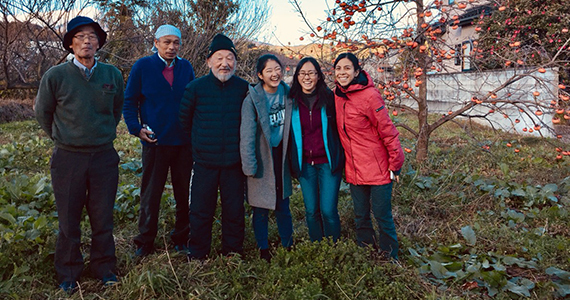
Tajima-san, second from left, and Lorena Rodriguez, right, on the natural farm in Tochigi.
By Lorena Rodriguez, 2017-19 Rotary Peace Fellow, International Christian University, Tokyo, Japan
In November, I traveled to Tochigi, to visit Tajima-san’s farm, where he practices natural farming. Masanobu Fukuoka, a Japanese farmer and philosopher, dedicated his life to demonstrating that “natural farming” can provide us with the conditions and the food necessary to survive on this planet.
Modernity has tricked humans into searching for more “sophisticated” farming methods that can produce more food faster, reduce labor, and increase production. Society believes that the industrialization of food is a step towards a more prosperous and efficient future. As a result, we have seen the privatization of seeds, expansion of monocultures, genetically modified plants and animals, deforestation, and the use of heavy chemicals.
Natural farming is an environmentally sustainable way of growing food, in which seeds are sown (they would be put inside clay pellets and distributed in a field), weeds are not pulled out, and insects are not killed. Basically, you let the land do all the work and you just wait until it is time to harvest. It honors the symbiosis of all creatures that live in our gardens and soil. Fukuoka showed that natural farming itself is to understand that there is no division between man and nature. We are all part of a network of beings that spins outwards from our center and projects towards the infinite.
Returning to natural balance
At Tajima-san’s farm, all beings living in the farm follow their natural course: trees are not pruned and plants are not watered. The garden is a green carpet of wild plants and various types of vegetables. The balance of nature in the crops is evident. Different colors, animals, plants, and organisms in the soils live in harmony. Tajima-san intervenes minimally when tending the crops, and nature just balances itself.
The pursuit of scientific knowledge has sometimes separated us from an understanding of natural systems and the truth that nature exists as an interconnected system. An object cannot be adequately studied apart from the whole. For example, an arachnid scientist wants to understand the role of a particular spider damaging rice crops. But that is impossible. Experts cannot understand the role of a predator on a farm at a certain time without taking into account the intricate relationship between insects, climate, soil, and plants.
This is also true in social organization. Humans are part of a living network of different beings, in which each being is key in maintaining the balance of the collective.
Seeds in the midst of a crisis
Walking on Tajima-san’s farm, I learned that he had planted hybrid F1 seeds. He told me that he cultivated these seeds so that nature could clean them. He plants the seeds, lets the plant grow to the point it produces new seeds, and then replants them. His task of purifying the seeds is a recognition of the sanctity of life. Humans like him are defending life as a whole, without exceptions.
I am grateful for my opportunity to visit Tajima-san’s farm, and for all the things I learned and will continue to learn. The experience filled me with a desire to see beyond the dual, linear, and capitalistic bias.
Learn more about Rotary Peace Fellowships
https://blog.rotary.org/2018/12/17/natural-farming-and-the-sanctity-of-life/
